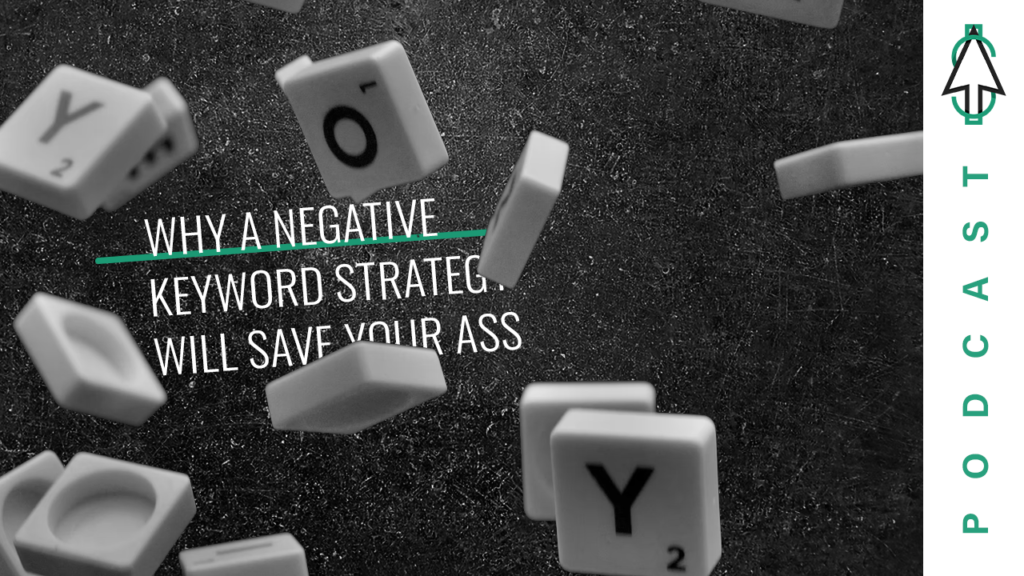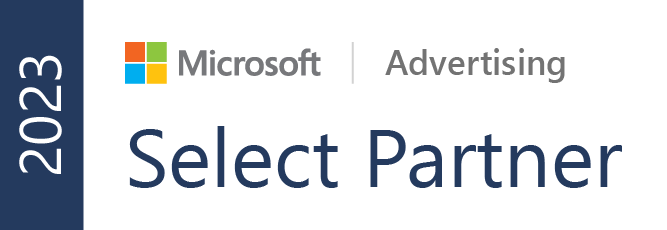
Episode 13
Why A Negative Keyword Strategy Can Save Your Ass

Watch
Alright. Welcome back to another episode for paying for attention today, we’re going to be talking about why a negative keyword strategy will save your ass. And we have with us today, Keegan Brown. So let’s go ahead and get things going.
All right, Kegan. So tell me why it’s good to have a strategy based around negative keywords.
Yeah, well, first, let’s start with what a negative keyword is in case anyone out there doesn’t know. And that is a set of keywords that prevents your ad from showing for one reason or another, usually because you just don’t want it to. And that definition also kind of answers the question of why you need a negative keyword strategy. And that’s because what we have found is that your ad spend, even in optimized accounts, will be spending on keywords that you do not want to be showing up for.
And you might not want to show up for these keywords for a lot of different reasons anywhere from you. You don’t want to promote those products. You don’t want to show up for things that are bad for your brand as well as you know, it’s irrelevant or it’s not something it’s worth paying for. And so that’s why it’s important. And if you don’t, what we’ve seen is that of all of your ad spend could be going towards, you know, intent. He does not align with driving ROI for your business.
That makes a lot of sense. So can you tell me a little bit about how you would go about researching negative keywords?
Yeah. So really the first thing would be to just like your normal keyword research, except in that keyword research that you’re doing. Look for keywords that are associated with keywords that you do want to show up for, have high volume and are keywords that you just don’t want to be paying for. So a lot of times this helps you filter out things that are more research based questions in keyword research that are maybe good for SEO. But you don’t want to be paying for because, you know, there’s a very low likely chance of somebody actually signing up on your site or purchasing anything on your site.
So some of the ways there is do a search for a keyword related to your business and see what Google auto tests. So let’s just say you’re a company and you put in your company name. Does it say log in afterwards or something like phone number or location, then that helps you start to see. Okay. Do I want to be paying for these types of searchers? That’s kind of the first way. The second way would be to if you’ve already been running ads, go through your search queries and really dive deep into what are people searching for and really looking for what doesn’t, you know, perform so you can use filters within Google or Bing ads for things like lower performance.
So no conversions, high cost per conversion, and that will typically help you find the first set of keywords that you should probably negate. And then you can also just kind of do an eyeball search search for high volume impressions, clicks, and cost and see if those search queries make sense. And that’ll give you the chance to just kind of skim through and say, okay, actually, this one I don’t want to show up for, and that’s how I would start looking for those negative keywords.
How popular is this? I mean, like, I mean, we’re talking about obviously there’s a problem with it, but, I mean, is it that much of a problem that people do it all the time?
Yeah. I mean, this is where experience really comes into play when it comes to running a paid search campaign. And we see a lot of times agencies are usually pretty good at doing this, because if you don’t, if your agency isn’t using this, you should probably fire them. And this is how we see a lot of times where agencies will be fired for not having a negative keyword strategy or negative keywords added. You’re showing up for a lot of bad search terms. So agencies are pretty good at getting it done because they know that it’s their ass.
If there’s not a negative keyword strategy in place. But a lot of times when companies hire internally or companies small marketing teams that are really just trying to get things set up and all of a sudden now they’re spending 20 $30,000 a month, they get some funding, or they’re really growing aggressively. That’s where we see a ton of waste that I’d spend on negative keywords or on keywords. That should be negated.
Really? That seems like that would add up pretty quickly, honestly.
Yeah. I mean, what we have found is that depending on who has been managing it, how long with their experiences is some of the worst ones which are very common? Honestly, it’s probably a good portion of the audits that we do. 20 of their budget is being completely wasted on keywords that they would probably be fired if their boss found out that they were running those ads for those keywords.
It is a lot of somewhat that spent. Can you dive a little bit deeper and talk a little bit about maybe some examples that you’ve seen.
Yeah. And I guess the way that I would structure this is to have some examples for what you should negate, most likely depending on what type of business you’re running for startups SAS companies. What we typically find are big wasters of their ad spend are things like login, cancel funding, IPO, those types of things where if you’re trying to drive, like signups demos, free trials, those types of things you don’t want to be targeting login or customer service or anything like that. Then when we come to, like, higher education, what we see a lot of times with universities is a lot of times students are searching for things like calendar, syllabus, those types of things.
Where, again, if you’re trying to get somebody in the door to request info from your University or take a tour or even apply, you don’t want to be paying for somebody who’s searching those types of queries. And then ecommerce is another very common one, where we see a lot of people looking for shipping information, returns, customer service service, phone number where some of e commerce sores definitely do take phone calls, get sales over the phone. But a lot it’s mostly customer service that they would be calling in for.
And so those are the things that you just want to proactively negate. If you’re in one of those industries and think about it for yours. Proactive negate those before you even launch your campaigns, it’s going to save you a lot a lot of wasted ad spend and frustration throughout your campaign process. Okay.
Those are some good examples. What about strategy? How do you personally approach negative keywords?
So basically, I would go through that process of doing a research going through examples. Think about your business, what’s commonly associated with your business and thinking of all those examples that you probably wouldn’t want to show it for and kind of get them in a sheet. But I would start to segment those like I mentioned earlier with being Proactive in a negative keyword strategy. You want to first come up with a universal list. You can Google Universal negative keyword list, and there’s going to be several different options out there for you.
But this is where things like sex, drugs, any X rated terms, lawsuit, things that you would never, ever want to show up for your brand to show up for. And so that would be kind of the very first step. Get together an entire list of every bad word you’ve ever thought of. Think about things like I said, lawsuit, news, death, tragic, those types of things, anything that could be ever associated with your brand, put them in a negative keyword list and apply that to every campaign that you’re about to launch or that you have right now.
So that’s the first thing we call a universal that’s always there every campaign. Then I would look at your competitor keyword brands. So you have three, four main competitors. People are searching them even if you want to show up for them. I would create a competitor list for negative keywords and apply it to all the campaigns that you’re not conquesting on. So maybe you have a campaign or two or a couple of campaigns that are conquesting on your competitors brand terms. That’s fine if that’s what you want to do.
But use those competitor keywords and a negative list for all your other non conquesting campaigns. This is so that you don’t cannibalize between campaigns that there’s no wrong intent going between the different campaigns and really fencing in those keywords to where they’re supposed to be and then do the same thing for your brand. So a lot of times, brands want to bid on their own brand name, and we’ve gone over some of the reasons why we want to do that. But again, similar to the competitor, there’s only probably a certain portion of your campaigns that you actually want to target your brand name.
Great. Target your brand name there for all your other non brand competitor, conquesting, all of those. You’d want to set up a negative keyword list with your brand name, your domain, and of your product names if they’re branded and apply that to all your other campaigns. So you’re just fencing in the intent that people have. And so that’s really the overall strategy. And there’s a lot of ways you can do this, but intra products and departments of your company, whatever it is and locations of big ones.
So you want to maybe negate all the cities around a major city from that one city campaign or a group. And that way you’re segmenting and fencing in people where they need to be going, and then the last two are really around match type. So being careful with match types, just with your targeting, the broad match phrase match, an exact match can really dictate what it’s all going to do. So if you broad match negate a keyword that is very common in your industry, that’s something that you probably are going to see very right away that your ads are going to stop showing for a lot of things and need to go there, maybe make that phrase or exact match to cut that down.
How often should someone go through and do this like to look back at their negative keywords? I mean, is this like a routine thing that you need to do, or is it something like, I don’t know, quarterly by monthly, anytime you update your keywords for your ads or anything, I mean, what are you thinking?
Yeah. So I think this exercise should be done every time you’re about to launch a campaign you’re going to launch, you need to be Proactive with a negative keyword strategy. However, in our experience, at least we never get every single negative keyword that we’re ever going to want the right way. The very first time, I would say, we typically knock out 80 90% of the poor keywords that you don’t want to be showing up for, anything that’s bad for brand, and then what we do on a regular basis, depending on how much you’re spending, how many keywords you have, anywhere from once a week, twice a month, we check search queries in our accounts just to make sure that, you know, nothing news coming through that could end up potentially cause harm to the brand.
Would you say there’s a magic number like, I mean, the clients that we go through and we do this for them? Is there kind of like a number that disappears like what’s typical of 20 or 30, 40 more. Or is it just kind of dependent upon industry or what should people look out for? Because I could see this as being shocking of saying, oh wow. There’s we’ve got a lot of negative keywords that we weren’t doing.
Yeah. So I think again, I think the big thing I would say there’s no magic number. The big thing is how much you’re spending, how many keywords you have the match types that you’re using for your keywords. So of course, if you have broad match, you’re going to see new queries a lot more often than if you’re using phrase and exact match, which is going to bring in bad queries as well. Or if you’re using a dynamic search campaign, you’re also going to have a lot a lot of new queries and a lot of them are probably going to be bad at first, but those are going to be the kind of the main factors of why you have to check your search queries and negate out more keywords on a more frequent basis is budget campaign type match types.
Alright, these are awesome. So what would you think would be the next steps for someone doing a negative keyword strategy?
Yeah. So I would first start out with that research again, if you’re just starting go do your keyword research. Look for keywords that you don’t want to show for, type some things into Google, see what’s associated with that. Or if you already are running campaigns, dive into your search queries and look at a long history of your campaigns and really dive deep into finding things that you don’t want to show up for and that don’t perform well. Second thing I would say is taking that and build lists, a universal list, a brand list, a competitor list, and then any other segments that you can think of that would help fence your keywords into the campaigns and a group that they should be getting and seeing and then upload and you’ll see the results pretty much overnight, depending on how bad you were needing a negative keyword strategy.
Awesome. These are all good points. Appreciate all the information about negative keyword strategies and why they should be done. And we look forward to hearing from you. If you have any questions for us, please reach out to us and we will see you next time paying for attention.
Have a Question?
If you have a question regarding paid media, fill out the form below and we will do our best in answering it in our show.

























